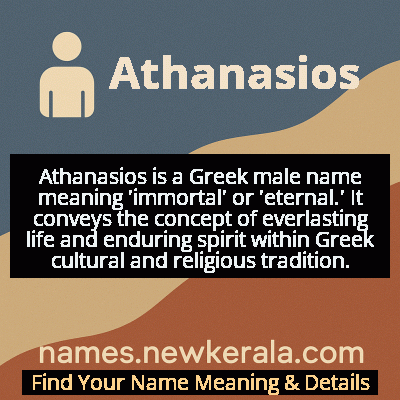Athanasios Name Meaning & Details
Origin, Popularity, Numerology Analysis & Name Meaning of Athanasios
Discover the origin, meaning, and cultural significance of the name ATHANASIOS. Delve into its historical roots and explore the lasting impact it has had on communities and traditions.
Name
Athanasios
Gender
Male
Origin
Greek
Lucky Number
8
Meaning of the Name - Athanasios
Athanasios is a Greek male name meaning 'immortal' or 'eternal.' It conveys the concept of everlasting life and enduring spirit within Greek cultural and religious tradition.
Athanasios - Complete Numerology Analysis
Your Numerology Number
Based on Pythagorean Numerology System
Ruling Planet
Saturn
Positive Nature
Ambitious, efficient, realistic, and authoritative.
Negative Traits
Materialistic, stressed, confrontational, and can be overly ambitious.
Lucky Colours
Dark blue, black.
Lucky Days
Saturday.
Lucky Stones
Blue sapphire, amethyst.
Harmony Numbers
2, 4, 6.
Best Suited Professions
Business leaders, managers, financial services, law enforcement.
What People Like About You
Leadership, determination, organizational skills.
Famous People Named Athanasios
Athanasios of Alexandria
Theologian and Bishop
Defended orthodox Christianity against Arianism and authored numerous theological works
Athanasios Diakos
Greek Revolutionary
Greek military commander during the Greek War of Independence, celebrated as a national hero
Athanasios Parios
Theologian and Educator
Influential Greek Orthodox theologian and teacher during the Modern Greek Enlightenment
Athanasios Christopoulos
Poet and Scholar
Renowned Greek poet and scholar of the Modern Greek Enlightenment period
Name Variations & International Equivalents
Click on blue names to explore their detailed meanings. Gray names with will be available soon.
Cultural & Historical Significance
Throughout Greek history, the name has been borne by numerous scholars, clerics, and revolutionaries, cementing its association with intellectual pursuit, religious devotion, and national identity. During the Greek War of Independence, figures like Athanasios Diakos embodied the name's meaning of 'immortality' through their heroic sacrifices for national freedom. In modern Greece, it remains a traditional name that connects contemporary bearers to centuries of Orthodox Christian heritage and Greek cultural continuity, serving as a living link to both religious tradition and national history.
Extended Personality Analysis
Individuals named Athanasios are often perceived as possessing strong moral convictions, intellectual depth, and enduring resilience. The name's meaning of 'immortality' seems to manifest in personalities characterized by perseverance, steadfastness in beliefs, and the ability to overcome significant challenges. They typically exhibit leadership qualities combined with a contemplative nature, often demonstrating both practical wisdom and spiritual insight that reflects the name's historical association with theological scholarship.
Many Athanasios individuals show a natural inclination toward education, philosophy, or religious pursuits, with a particular strength in defending their principles against opposition. Their personality often blends traditional values with modern adaptability, creating individuals who honor heritage while engaging with contemporary society. The name suggests someone who is reliable, principled, and capable of deep commitment to causes and relationships, with a quiet strength that inspires confidence in others. This combination of intellectual rigor and moral fortitude makes them natural leaders in both professional and community settings.
Modern Usage & Popularity
In contemporary times, Athanasios remains a respected traditional name in Greece and among Greek diaspora communities, though its usage has become less frequent than more modern Greek names. It maintains strong connections to Orthodox Christian tradition and is often chosen by families seeking to honor religious heritage or family traditions, particularly in northern Greece and among families with strong ties to the Greek Orthodox Church. While not among the most common baby names in modern Greece, it continues to be used consistently, often shortened to familiar forms like 'Thanos' or 'Taso' in daily life. Recent years have seen some revival of traditional names like Athanasios as younger generations reconnect with cultural roots, though it remains more common in rural areas and among families with strong religious observance than in urban centers where naming trends have become more international.
Symbolic & Spiritual Meanings
The name Athanasios carries rich symbolic meaning beyond its literal translation of 'immortal,' representing eternal spiritual truth, unwavering faith, and the triumph of orthodoxy over heresy drawn from Saint Athanasios' historical defense of Christian doctrine. Symbolically, it embodies the concept of enduring legacy—both in terms of spiritual salvation and cultural continuity—suggesting someone who serves as a guardian of tradition and truth, a bridge between past wisdom and present understanding. In metaphorical terms, Athanasios symbolizes resilience against temporal challenges and the eternal nature of core principles and beliefs, representing the human aspiration toward something lasting and meaningful beyond physical existence. This makes it a name that carries profound philosophical and spiritual weight in Greek culture, evoking themes of eternal life, unchanging truth, and the victory of faith over temporary obstacles.

